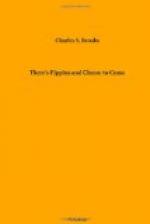I accepted the part he offered me. “Perhaps you would like a knife and plate,” I said. “I can find them in the pantry.”
“Not for me,” he replied. “I prefer to eat mine this way.” He took an enveloping bite.
“I myself care nothing for plates,” I said. We ate in silence. Presently: “You have my habit,” I said, “of eating everything, skin, seeds and all.”
“Everything but the stem,” he replied.
By this time the orange peel was hissing and exploding.
“You are an odd boy,” I said. “I used to put orange peel away to dry in order to burn it. We seem to be as like as two peas.”
“I wonder,” he said, “if that is so.” He turned in his chair and faced me, although his face was still in shadow. “Doubtless, we are far different in many things. Do you swallow grape seeds?”
“Hardly!” I cried. “I spit them out.”
“I am glad of that.” He paused. “It was a breezy hilltop where I lay. I thought of you all afternoon. You are famous, of course?”
“Dear me, no!”
“Oh, I’m so sorry. I had hoped you might be. I had counted on it. It is very disappointing. I was thinking about that as I lay on the hill. But aren’t you just on the point of doing something that will make you famous?”
“By no means.”
“Dear me, I am so sorry. Do you happen to be married?”
“Yes.”
“And would you mind telling me her name?”
I obliged him.
“I don’t remember to have heard of her. I didn’t think of that name once as I lay upon the hill. Things don’t turn out as one might expect. Now, I would have thought—but it’s no matter.”
For a moment or so he was lost in thought, and then he spoke again: “You were writing when I came into the room?”
“Nothing important.”
The boy ran his fingers in his hair and threw out his arms impatiently. “That’s what I would like to do. I am in college, and I try for one of the papers. But my stuff comes back. But this summer in the vacation, I am working in an office. I run errands and when there is nothing else to do, I study a big invoice book, so as to get the names of things that are bought. There is a racket of drays and wagons outside the windows, and along in the middle of the afternoon I get tired and thick in my head. But I write Saturday afternoons and Sunday mornings.”
The boy stopped and fixed his eyes on me. “I don’t suppose that you happen to be a poet?”
“Not at all,” I replied. “But perhaps you are one. Tell me about it!”
The boy took a turn at the fire with the poker, but it was chiefly in embarrassment. Presently he returned to his chair. He stretched his long arms upward above his head.
“No, I’m not,” he said. “And yet sometimes I think that I have a kind of poetry in me. Only I can’t get it into words. I lay thinking about that, too, on the hillside. There was a wind above my head, and I thought that I could almost put words to the tune. But I have never written a single poem. Yet, goodness me, what thoughts I have! But they aren’t real thoughts—what you would regularly call thoughts. Things go racing and tingling in my head, but I can never get them down. They are just feelings.”




